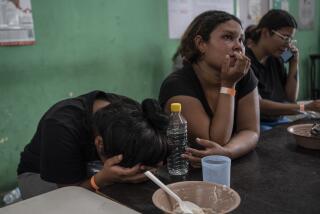For Many Immigrants, Holidays Are Time to Bring Home the Bounty
WASHINGTON — The cargo hold of the big jet bound for Central America gapes outside the terminal at Dulles International Airport in northern Virginia as the massive packages and mounds of luggage pile up in front of the ticket counter inside.
To airport baggage handlers, the boxes and bags bound for Central America can be measured in tons. To many of the passengers who struggle under their burden, the baggage is something of a different measure.
Going home for the holidays is a particularly poignant trip for many among the tens of thousands of people who left their Third World countries in hope of finding opportunity in the Washington, D.C., region.
To Hector Hernandez--who brought cardboard boxes bulging with presents to Dulles--the gifts he is carrying home are a tangible reminder that it was all worth it: the long, risky trip from his native Honduras to the United States without immigration papers; the nervous wait for the amnesty documents that gave him legal status; the low-paying dishwashing job he held until being promoted to cook at a Rockville, Md., restaurant.
He can serve up evidence of that success when he and his brother, Javier Hernandez, arrive for Christmas in La Ceiba, a beach city on the Caribbean coast of Honduras. The proof is in the boxes that they can now afford to fill with everything from dolls and frilly dresses for Hector’s two young daughters, who live with his ex-wife in Honduras, to a fancy air compressor for other relatives.
“These are all given with heartfelt feelings and will be received with heartfelt feelings,” Javier Hernandez, 27, says in Spanish. “We Hispanics are always motivated first by our families--that is the most important thing.”
Like tens of thousands of Central American immigrants in airports across the country, the brothers are participating in an annual rite. Laden with gifts, they return each year to family and friends. The gifts represent more than the consumer side of Christmas to the brothers. The jammed suitcases are the manifestation of a homespun sense of civic and family responsibility that prompts them to share with the people they left behind. The cargo is also a sign that they are making a go of it in a country where many of their friends aspire to live.
The Hernandez brothers say they are overwhelmed with pride as they watch a porter push a metal cart overflowing with their suitcases and topped with a long, wide box holding a brand new Huffy 10-speed bike for their 10-year-old brother, Eli.
Hector Hernandez twice repeats the Spanish word for pride--orgullo. It is the kind of melodic word that a speaker can stretch out gracefully, and Hernandez lingers on the final syllable with satisfaction.
All around the brothers, similar carts are flowing toward the check-in counter at TACA Airlines, a Salvadoran carrier that shuttles passengers to El Salvador, Guatemala, Panama, Honduras and Nicaragua.
Throughout the week, passengers have been packing and unpacking boxes while waiting in line at the TACA counter. A few have arrived with huge boxes and suitcases bound in electrical tape only to discover that their luggage is too large to carry on the plane. Hurriedly, they try to split the contents into smaller pieces of luggage or duffel bags. Otherwise, they’ll have to pay a cargo fee to ship the television sets and stereos that they can buy in the United States for one-third the price they would pay in Central America.
“I was trying to be economical, but now it’s not worth it,” says Carmen Matamoros, 34.
Matamoros, a Delaware Technical and Community College student, decides to take $100 in cash for her relatives, rather than pay the same amount to ship her suitcase in the plane’s cargo hold.
A few feet away, brothers Henry Lopez and Raul Mendoza have the same problem. For 17 years, they have been pooling money each Christmas with a third brother, Manuel Lopez, to send their mother to San Salvador.
The brothers decide it’s worth it to pay the cargo fee for their big blue suitcase so that their mother, Esther Lopez, can continue her long-standing tradition of walking through the streets of her old neighborhood and passing out gifts to any friends she encounters. Hershey’s chocolate bars are a favorite, Esther Lopez says, not to mention the American-style clothing that she sets aside for her nieces and nephews.
“It gives me such great joy,” says Lopez, 60, who worked for years as a housekeeper and now cares for her grandchildren in Alexandria, Va.
More to Read
Sign up for Essential California
The most important California stories and recommendations in your inbox every morning.
You may occasionally receive promotional content from the Los Angeles Times.










